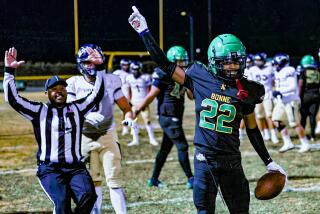City Bans Coaches From Recruiting, but Penalties for Offenses Unclear
- Share via
It’s going to be more difficult for coaches to recruit athletes illegally in the City Section. But if a coach is caught, he probably won’t be disciplined.
That, apparently, is the City Section’s message after a five-monthlong investigation into the illegal recruiting of athletes by Cleveland High. Policy has been strengthened, but penalties are unclear.
In the wake of the investigation, which began in February, the City’s Interscholastic Athletic Committee has instituted a rule prohibiting recruiting. The policy will be amended in the fall, according to Hal Harkness, the City’s athletic commissioner.
The new IAC rule, No. 229, is titled “Recruiting PWT and Magnet Students.” It reads: “The recruitment by individual coaches of potential PWT and magnet students is illegal. Contact with potential PWT and magnet students is limited to the procedures established by the district’s integration planning and management guidelines.”
No longer will coaches be able to recruit through the district’s permit with transfer (PWT) and magnet programs, which are designed to provide voluntary integration and intensified study in specialized academic areas.
But exactly what sort of disciplinary action, if any, will be taken against offenders is largely in question.
In the recent case involving Tom Smith, a teacher and the “B” football coach at Cleveland, the school’s principal, Ira Mae Windham, ignored a recommendation by IAC and decided last week not to suspend Smith.
In May, IAC declared Smith guilty of using “undue influence” in recruiting athletes to attend Cleveland last year while Smith was a teacher at Madison Junior High in Van Nuys. Normally, students from Madison attend Grant High. IAC recommended that Smith be suspended from coaching for the 1987-88 school year.
Because IAC is not authorized to discipline school employees, the penalty phase of the case was handed over to Dan Isaacs, an assistant superintendent in the Los Angeles Unified School District. Isaacs, in turn, asked Windham to discipline Smith as she saw fit. She apparently found him fit to coach.
“We had a very serious conference and discussed what is expected as a staff member and coach,” Windham said. “Tom absolutely denies soliciting youngsters to attend Cleveland. I recommended to the assistant superintendent that Tom be allowed to coach.”
Reaction to Windham’s decision has been restrained, even from those who believe most strongly that Smith is guilty.
“I’m surprised. I’ll leave it at that,” said Don Thomas, an IAC member who chaired the committee that recommended Smith’s suspension. “People can draw from that what I am thinking.”
Although the recommendation of IAC was ignored, Harkness continues to have faith in the system.
“I believe all our principals have high integrity and do whatever is necessary to be impartial and fair,” Harkness said. “I hope the message from all of this would be that if there is an accusation, it will be investigated.”
Grant officials prompted the investigation into Smith’s actions in February. Several Grant students offered written testimony that Smith recruited them, saying the coach detailed how they could attend Cleveland through the magnet program.
Grant Principal Bob Collins said in March that he would appeal the case to the district superintendent if its resolution was not satisfactory.
Now Collins claims the appeal was exhausted when IAC turned the case over to Isaacs. And Collins refuses to question the judgment of Windham, a fellow principal.
“I can’t appeal it,” Collins said. “The district turned it over to the school and I respect the judgment of my colleague. I have a great deal of faith in the principals I work with. We share a feeling that the integrity of the athletic program is of the utmost importance.”
Yet if that integrity is violated, little can be done to penalize the violator.
“The athletic office and IAC are not equipped to investigate illegal recruiting and do not have the authority to discipline coaches,” Harkness said. “We can only continue to hope that adult role models show positive leadership and high ethical standards.”
More to Read
Get our high school sports newsletter
Prep Rally is devoted to the SoCal high school sports experience, bringing you scores, stories and a behind-the-scenes look at what makes prep sports so popular.
You may occasionally receive promotional content from the Los Angeles Times.







